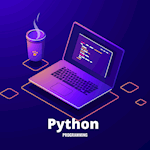Data Visualisation with Python Instructor-led Training
Free server access, Class recordings, Certification guidance, Job & Interview assistance, Course Completion Certificate
Uplatz
Summary
- Uplatz Certificate of Completion - Free
- Tutor is available to students
Add to basket or enquire
Overview
Uplatz offers this comprehensive training on Data Visualisation with Python. This course will be conducted as online instructor-led training classes.
Data visualisation is the discipline of trying to understand data by placing it in a visual context so that patterns, trends and correlations that might not otherwise be detected can be exposed. Python offers multiple great graphing libraries that come packed with lots of different features.
"A picture is worth a thousand words." We are all familiar with this expression. It especially applies when trying to explain the insights obtained from the analysis of increasingly large datasets. Data visualisation plays an essential role in the representation of both small and large-scale data. One of the key skills of a data scientist is the ability to tell a compelling story, visualizing data and findings in an approachable and stimulating way.
The online tutor-led training course Data Visualization with Python will expose you to all of the most important and practical uses of the Python programming language for data wrangling, administration, analysis, and basic visualisations. The course will teach you how to use the Python programming language for data science and a variety of Python libraries developed for scientific computing and data analysis, such as NumPy, pandas, matplotlib, IPython, SciPy, and others.
The course covers a variety of topics related to data processing and analysis using Python language including standard Python data structures and other data objects used for scientific and statistical computing available in NumPy (multi-dimensional arrays) and pandas (Series, DataFrame) libraries, importing/exporting data from various file formats (Excel spreadsheets, csv, tab, txt etc.), basic and more advanced data transformations and essential data wrangling techniques, summaries, data aggregations, cross-tabulations, frequency and pivot tables, simple graphical representations of the data (bar plots, histograms, box plots etc.) using matplotlib, seaborn and plotnine libraries, introduction to hypothesis testing with correlations, t-tests and essentials of predictive modelling using multiple linear regression methods with SciPy, pingouin, statsmodels and scikit-learn packages.
With Data Visualisation with Python course you will learn-
- You'll learn Matplotlib and Seaborn and have a solid understanding of how they are used in applied machine learning.
- You'll work through hands on labs that will test the skills you learned in the lessons.
- You'll learn all the Python vernacular specific to data visualization you need to take you skills to the next level.
- You'll be on your way to becoming a real world machine learning engineer or data engineer.
Course Outcomes
- Learn how to use Python to understand and use various plot kinds.
- Investigate and use various charting libraries.
- Understand how to see things and how to make them work for you.
- Improve your Python data manipulation abilities.
- Use industry-standard software like as Matplotlib, Seaborn, and Bokeh.
- Recognize many data forms and representations.
Course media
Description
Data Visualisation with Python - Course Syllabus
Module 1 - Introduction to Visualization Tools
- Introduction to Data Visualization
- Introduction to Matplotlib
- Basic Plotting with Matplotlib
- Dataset on Immigration to Canada
- Line Plots
Module 2 - Basic Visualization Tools
- Area Plots
- Histograms
- Bar Charts
Module 3 - Specialized Visualization Tools
- Pie Charts
- Box Plots
- Scatter Plots
- Bubble Plots
Module 4 - Advanced Visualization Tools
- Waffle Charts
- Word Clouds
- Seaborn and Regression Plots
Module 5 - Creating Maps and Visualizing Geospatial Data
- Introduction to Folium
- Maps with Markers
- Choropleth Maps
Who is this course for?
Everyone
Requirements
Passion to achieve your goals!
Career path
- Data Visualization Analyst
- Data Visualization Developer
- Data Visualization Engineer
- Data Analyst
- Data Scientist
- Data Engineer
- MI Analyst
- Reporting Analyst
- Python Programmer
- BI Developer
- Data & Analytics Professional
- Data Consultant
Questions and answers
Currently there are no Q&As for this course. Be the first to ask a question.
Certificates
Uplatz Certificate of Completion
Digital certificate - Included
Course Completion Certificate by Uplatz
Reviews
Currently there are no reviews for this course. Be the first to leave a review.
Legal information
This course is advertised on reed.co.uk by the Course Provider, whose terms and conditions apply. Purchases are made directly from the Course Provider, and as such, content and materials are supplied by the Course Provider directly. Reed is acting as agent and not reseller in relation to this course. Reed's only responsibility is to facilitate your payment for the course. It is your responsibility to review and agree to the Course Provider's terms and conditions and satisfy yourself as to the suitability of the course you intend to purchase. Reed will not have any responsibility for the content of the course and/or associated materials.


